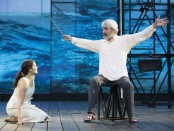Becky Nurse of Salem
In any event, Ruhl has not written a play set in 1692 or a sequel to "The Crucible" but a comedy about free-spirited Becky Nurse, a descendant of the accused witch Rebecca Nurse, a pious 71-year-old woman who had nine children and was hard of hearing, who wishes to set the record straight. Although a fascinating premise, the problem with play is that it throws in everything except the kitchen sink – but, in fact, it makes use of metal freestanding toilet. The play attempts to cover multiple themes and topics: revisionist history, the opioid crisis, the generation gap, teenage suicide, the Salem Witch Trial, unemployment, medical care, the supernatural, adultery, and office harassment. Conceived and written between 2016 - 2019, the play also tries to connect Trump Rallies in which the crowds shouted “Lock her up” and Trump’s repeated use of the words “witch hunt” and his attempt to appear the victim to the hysteria of the Salem Witch Trial in 1692. All of this is too much weight for any one play. Director Rebecca Taichman’s uneven production does not help, though much of that is the fault of the shift in tone in the writing. [more]


